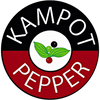Why is Kampot pepper better than regular store-bought pepper?
When you taste Kampot pepper, you immediately notice the difference. Its full flavor, intense aroma, and long-lasting aftertaste rank it among the best peppers in the world. But what makes it so exceptional? Let's look at the key factors that make this pepper so unique, and compare them with how pepper is usually cultivated in mass production.

1. Cultivation in ideal conditions
The Kampot region in Cambodia has a unique microclimate, rich soil, and optimal rainfall. These conditions allow the pepper to develop a complex aroma and full flavor.
Mass production: pepper is not always grown in ideal conditions, often on plantations with degraded soil where artificial fertilizers are used to achieve higher yields, which affects the taste and quality.
2. Traditional hand harvesting
Each peppercorn is handpicked at the optimal ripeness – one berry at a time!
This ensures that only the best pieces are selected – each berry is still inspected.
Mass production: common pepper is often harvested mechanically, which means that unripe, overripe, and damaged berries are mixed, negatively impacting the final taste.
3. 100% natural processing
Kampot pepper is sun-dried without chemical treatments.
Mass production: industrial peppers are often chemically treated for faster drying and longer shelf life – which can negatively affect their taste and natural aromatic profile.
4. Long maturation and fermentation period
The long ripening of Kampot pepper allows for a deeper development of flavors. For example, red pepper, which is harvested fully ripe, has milder and fruitier tones.
Mass production: pepper is often harvested prematurely to speed up processing and increase yields. This leads to less developed flavors and weaker aroma.
5. Fair trade and direct cooperation with farmers
.pepper..field works directly with original family farmers, ensuring them fair rewards, sustainable conditions, and direct purchase. Fresh pepper directly from the farm is thus on your table within a few days or weeks.
Mass production: commercial pepper often comes from anonymous suppliers who receive low purchase prices and are forced to cut costs – and thus the quality of the product. The resulting pepper then travels through several resellers to its destination, sometimes taking several months.
6. Intense aroma and flavor experience
Kampot pepper has floral, fruity, and spicy tones that gradually and long develop on the tongue.
Mass production: common pepper often tastes simply spicy because it does not have enough time to develop rich flavor nuances. That is why you may not even like regular pepper – because it lacks taste.
7. Exclusivity and certified quality
Kampot pepper is protected by a geographical indication (PGI), which guarantees its authenticity and quality. It is something like genuine champagne.
Mass production: industrially produced peppers do not have this certification, which means they may contain blends from different regions without guaranteed quality.
Kampot pepper from .pepper..field is simply synonymous with honest taste and premium quality. Every dish you prepare with it gains a new dimension of flavor – just try it once and you will never want to go back to regular pepper!
Share






